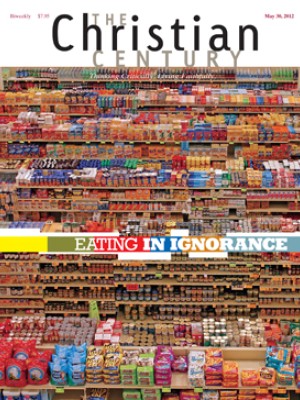Methodists maintain policies on sexuality
Despite emotional protests and fierce lobbying from LGBTQ rights groups, United Methodists voted to maintain their denomination’s stance that “the practice of homosexuality is incompatible with Christian teaching”—an expected outcome as the denomination becomes increasingly international in membership.
Two “agree-to-disagree” proposals were soundly defeated in separate votes by the nearly 1,000 delegates gathered in Tampa, Florida, for the United Methodist Church’s ten-day General Conference that ended May 4.
One proposal would have replaced the “incompatible” phrase in the Book of Discipline, which contains the denomination’s laws and doctrines. Both proposals sought to soften the doctrine by adding statements about homosexuality that were more ambiguous.
Read our latest issue or browse back issues.
While other mainline churches hold their legislative conventions at two- or three-year intervals, the UMC’s General Conference convenes every four years. United Methodist numbers are shrinking in the U.S. but growing in Africa and Asia, shifting the balance of power to overseas conservatives. The number of African delegates in Tampa was up 32 percent over the 2008 meeting.
The denomination’s diversity was on display May 3 as gays and lesbians pleaded for recognition of their “sacred worth” and an African delegate, speaking through an interpreter, compared homosexuality to bestiality. Proposals defeated that day would have acknowledged that diversity, but, some conservatives argued, at the cost of muddying traditional doctrines.
One proposal would have changed the Book of Discipline to say that gays and lesbians [are] “people of sacred worth” and that church members differ about “whether homosexual practices [are] contrary to the will of God.” Adam Hamilton, a megachurch pastor in Leawood, Kansas, argued that the proposal would “acknowledge our disagreement on a huge issue that is separating churches in North America today.” That proposal was defeated by a 54 percent majority.
“I see no reason why we should state [in the Book of Discipline] that we disagree,” said Maxie Dunnam, former president of Asbury Theological Seminary in Wilmore, Kentucky. “We disagree on almost every issue we consider.”
The delegates defeated another compromise proposal by an even wider margin: 61 to 39 percent. The resolution would have acknowledged a “limited understanding” of human sexuality and called on the church to “refrain from judgment regarding homosexual persons and practices until the Spirit leads us to new insight.”
Steve Wendy of Texas argued that the compromise would cause confusion and lead the church to “stumble” in its Christian witness. “If you look at our largest congregations and crunch the numbers, they are all reaching young adults successfully,” Wendy said. “And, overwhelmingly, they teach and proclaim God’s truth without compromise.”
But Jennifer Ihlo, a lay delegate from the Baltimore/Washington Conference, argued in favor of the compromise. “I want to be clear that this is not an abstract issue. This is about people who are being harmed by the church and by the use of the ‘incompatibility’ language,” Ihlo said. “I am a lesbian and a child of God, and I strongly urge the body to support this compromise language so that gay youth . . . will recognize that the church loves them and God loves them and the violence and pain and suicide will stop.”
After the proposals were defeated, gay rights activists flooded the assembly floor and disrupted the session by singing the hymn “What Does the Lord Require of You?” Indiana Bishop Michael Coyner, chair of the morning session, told the protesters, “I think you’re actually hurting your point.” When the protesters refused to stop singing, Coyner closed the session and sent the delegates to an early lunch.
According to several sources, conference planners, evangelical leaders and gay and lesbian advocates then conferred and determined that there was little use in holding additional contentious debates on homosexuality. Proposals to ordain gay clergy and bless same-sex unions held little chance of passing, the parties agreed, and so were pushed to the back of the agenda, essentially assuring that they would not be debated.
“Leaders of the demonstration were told that the legislation was postponed to avoid more harm to LGBT people and their supporters,” the Love Your Neighbor Coalition said in a statement. “The United Methodist Church had an opportunity to offer love, grace, and hope,” the coalition said. “Sadly, we did not take that opportunity.”
In other matters:
- Delegates voted May 1 to end guaranteed clergy appointments. The job security measures date back to the 1950s, when they were instituted to protect ministers from arbitrary abuse or discrimination, supporters say. Critics say those original goals have helped mediocre clergy retain their posts.
- Rejected by delegates was a proposal for “setting aside” a bishop to serve as a full-time president of the Council of Bishops. At present, men and women elected to that position are expected to continue their duties as regional bishops.
- The most comprehensive goal facing delegates was to restructure church agencies and downsize their boards. A committee adjourned the evening of April 28 without recommending one of two plans officially submitted or another unofficial plan. Many observers called the committee proceedings a “debacle,” according to United Methodist News Service. “This was money wasted, time wasted; this is not the will of God,” said Dale M. Witherspoon, a delegate from northern California.
An 80-page restructuring plan was adopted May 2, and the nine-member Judicial Council—the church’s highest court—was asked routinely to rule on its constitutionality. At 4:30 p.m. on the gathering’s last day, the Judicial Council “dropped a bombshell that rocked the assembly to its core,” according to the news service. The delegates plus 4,000 visitors and staff were informed that the council ruled unanimously that the plan was unconstitutional, in part because it intrudes “into the constitutional authority of the Council of Bishops for general oversight of the denomination.” —RNS






